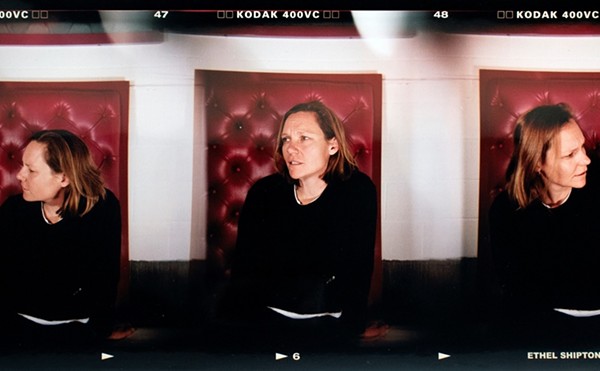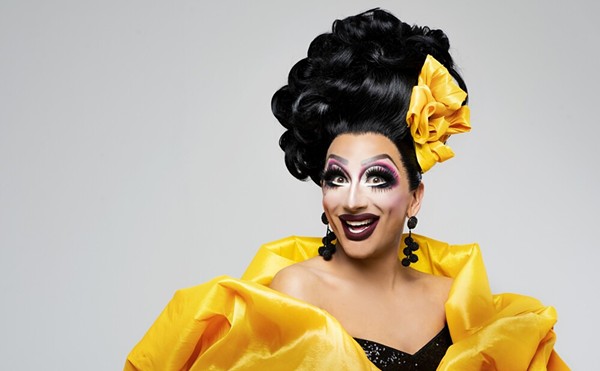Octavio Solis’s breakthrough drama, Lydia, has made the El Paso-born playwright a national sensation in the theater world. But for the 50-year-old Solis, who has toiled in the theatrical trenches for half his lifetime, the idea of overnight success chafes a bit. He’d prefer to be described as an “up-and-coming” playwright.
Modesty and sunglasses aside, Solis’s career is so bright one shouldn’t be taken aback if sooner rather than later he becomes the first Chicano playwright to win the Pulitzer Prize for Drama. Lydia, a tale of family deception, tragedy, and revelation set in 1970s El Paso, has given him his most successful year as a playwright. It began when the play’s entire script was published in the prestigious American Theatre Magazine (a second time for Solis), and was followed by successful runs in Denver, at the Marin Theatre Company, and the Mark Taper Forum in Los Angeles. The New York Times called the recent Yale Repertory production of Lydia “a fresh, penetrating, often blissful play.”
San Antonio theatergoers familiar with local productions of Solis’s earlier work (including La Posada Mágica and Santos & Santos) will get to judge for themselves when Lydia — the first of his works to be produced at his alma mater Trinity by AtticRep — opens this week.
En persona, Solis es un vato lleno de corazón, alma y creatividad. More importantly, he is among the few Chicano playwrights whose work examines and projects the unique Mexican-American point of view onto the world stage. Rarely do two Chicano playwrights have the opportunity to kick back, kvetch, y tirar un rollo about their craft and mutual interests. Our conversation took place during Solis’s visit here in November for rehearsals of Lydia.
What brought you to playwriting?
Truthfully? Acting. I wanted to be an actor; I trained to be an actor. Ever since high school, when my first kiss was my first stage kiss, I said I am going to stick with theater. I want to make a career of it, a life of it.
What made you go from acting to playwriting?
When you’re acting in class, it is nice when you get to play Iago and roles in Pinter plays. In the real world, it’s a little different. In the real world, they considered me for the chauffeur, the gardener, the butler, the cook, and walk-ons. And I said, what’s wrong with this picture? And I lamented this until I got cast in Native Speech, a play by Eric Overmyer. I got to play this strange, killer transvestite in this crazed Puerto Rican gang. And the language I heard in that play was so stunning, so remarkable.

So I resolved to write my own plays and cast myself in them so that I could excite all the local casting directors, agents, etc. Well, they were excited by the writing, but not by my acting. I took the hint and became a playwright instead.
How did you land at Trinity University?
They had an excellent theater program, and I wanted to be part of it. I applied, got accepted with a huge scholarship and a Texas Equalization Grant. I graduated top 10 at Riverside High in El Paso with a high GPA. That meant something back then.
Did you have classes with the legendary Paul Baker, who recently passed?
Yes. I had classes with him in Integration of Abilities, which became my working philosophy as an artist. I understood it immediately. And when I came across the Viewpoints of Anne Bogart, they seemed to correspond very faithfully to the integration of abilities.
Baker lived a long healthy life — almost a hundred years. He made an impact on so many artists and Texas arts and letters in general that it does feel like the end of an era.
Carlos Fuentes once described the border as a festering scar that refuses to heal. I know how important the border is to your work. On what side do your loyalties lie?
My loyalties lie in that gray zone. If you really want to place me, it’s in the water — el Rio. I have this yearning, this aching need to belong more to Mexico, but I am an American. There’s just no way around it. I go to Mexico and they look at me, without opening my mouth, they say, “Yanqui! Eres un Yanqui.”
Pocho.
Yes, pocho. They know me by the clothes I wear, the look in my eye. Yet in the U.S. I am never purely American. I’m never just that. I live in the hyphen. That isn’t a bad place to be. It is a good place, because it allows me to see the world from both sides of the river.
We are also Tejanos — a term that doesn’t carry a lot of that baggage.
Yes, because then it’s not about nationality or a national consciousness — it becomes more of a cultural consciousness.
Is it important that we write solely on our background or is writing outside the box just as important?
We have to write the story that calls us. And for some, if they haven’t had that unique experience that you and I call Chicano — if they were born into it but not raised into it — I could understand why they wouldn’t write about it.
The one that is unique to me, the one I have access to, is my Latino viewpoint, my Latino blood. I write about it because that is where I come from. It is the box I was born in. But it doesn’t mean that my perspective can’t also take in other milieus, other environments, and other ways of seeing the world.
Your play Santos & Santos is based on actual El Paso history. What was it about the Chagra Brothers that made you consider it as a drama?
They were such local heroes, beloved of the Latino community and yet so bound up in the curse of the region — narcotics. But they were also their own entity — independent of the laws and strictures of Texas and society. I still find that spirit there, that frontier spirit. And these three brothers might as well been in the old West.
At some point I had my own story to tell. I made so many changes, because I was interested in telling a Chicano story, a Latino story, but the Chagras are not Latino, they’re Lebanese. They never intermarried. They supported the Chicano cause, but they stayed true to their Assyrian roots.
I needed things to go a different way than they actually did in real life, so it couldn’t be about them anymore. I’d already messed with history too much. In the end, I became less concerned with the facts and more interested in my story — and that guided me in a different direction.
I’ve been criticized for writing a play about drug lord Fred Carrasco because he isn’t a role model and his life offers little hope or redemption for our community. Have you encountered that with Santos & Santos?
I have heard it. Not just from this play but from others as well. And my answer to that has always been, “Don’t look to my characters for role models; look to me. I went to college, I’m a writer, and I live a clean life.” My characters are always fallen characters.
As far as redemption goes, I think it is overrated. There is great satisfaction in damnation. It is a good place to go because that is where the lessons are.
Can a playwright make a living, support a family on his writing alone, or is that a privilege of New York playwrights like David Mamet?
I haven’t been done in New York a lot, and if I had, I’d probably be more successful. But I’m successful enough. I’m OK. I’m making a living now. This has been the most successful year in my life as a playwright, but I feel I can’t trust that. Some years are going to be really great, others fallow. So I can’t always sit on those laurels.
But honestly, none of this would have been possible if it weren’t for my wife. She is the breadwinner; she pays the mortgage and the bills. My income is our discretionary income. If we had to live on my income, I’d have to take up a teaching career, too. Half the credit for my work goes to my wife.
Are Chicano plays still viable? In his manifesto on Chicano theater, Luis Valdez railed against the “gringo-seco” productions that once prevailed.
Those are still around. Those will never go away. They are just bad plays and productions. And you’ll find “gringo-seco” productions written by Latinos, too. But that said, there is always room for that Chicano perspective.
I aim to do that with Ghosts of the River, a shadow play. It is written for my community. When I’m writing for other theaters, I’m writing for that theater, and they have their subscribers. Most are going to be white, and I know that. But I can step on the other side and say no, this one is for my people.
AtticRep is ballyhooing their production of Lydia as “the company’s first play by a Latino playwright with an all-Latino cast.” Isn’t it a little late in coming — especially in Latino SA?
Yes. I would say that in San Antonio, it should have been done a long time ago. But I’m not going to look a gift horse in the mouth and say, “Motherfuckers, you should have produced me 20 years ago!” Because, honestly, where was I 20 years ago? I probably wasn’t that good.
That they are making the breakthrough now is good, and they should be congratulated. But they know they could have done it sooner and that they could have done other Latino artists before that. It is fantastic that AtticRep in just four years since its very first play is doing mine. Four years. For other theaters, it’s 50.
I love the dynamic of splitting the mestizo image in your work — the duality of pitting the good father against the bad father in El Otro, and the protester brother going mano a mano with the patriot brother in Lydia.
Actually it’s two cousins, and one `Alvaro` has traded one uniform for another because he’s hiding who he is as a man even from himself. He thinks he is being more American — drawing that line in the sand. But all it does is put a fence between him and his cousin Rene `Lydia’s brother`, who is in love with him, who wants him, and whom he treats as a mojado. So these two young men who were lovers take on adversarial roles: You’re gay; I’m straight. You’re mojado; I’m migra. And it places himself and his cousin in untenable situations that have to blow up at some point.
Does the machista attitude in the Mexican American community remain a big problem in our daily lives?
I think it will never go away. We deal better with it now because we understand why it comes about, what its roots are. And how it’s a mode of behavior that is so codified that you can just tell when you are falling into the stupid role of “I’m the macho man.”
But in every stereotype there are elements of truth. And they bear looking at, especially in the Latino culture, which still largely stigmatizes homosexuality. The more we examine it, the more we’ll be able to deal with it. I also think it’s because so many Latinos are Catholic, and in the Catholic Church it’s taboo.
What idea would you like audiences to come away with after seeing Lydia?
That acts are above judgment. Some acts may be horrific, but they are done out of love. •















